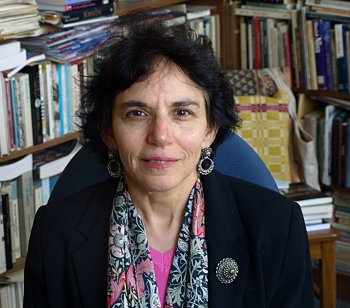 EUGENE, Ore. -- (May 30, 2012) -- In "Romani Routes," University of Oregon cultural anthropologist Carol Silverman details her years of research on Europe's largest ethnic minority, Roma, who long have been revered internationally for their folk music but reviled as a people.
EUGENE, Ore. -- (May 30, 2012) -- In "Romani Routes," University of Oregon cultural anthropologist Carol Silverman details her years of research on Europe's largest ethnic minority, Roma, who long have been revered internationally for their folk music but reviled as a people.
"Romani Routes" (Oxford University Press) looks closely at Romani music and culture, primarily in the Balkans, from the 1970s to the present -- tracing the impacts of socialism, it's fall, and, now, the emerging challenges of rising anti-migrant sentiments, deportations and physical attacks.
Roma are the heart and soul of long-popular Gypsy music, which first attracted Silverman's interest in the early 1970s while an undergraduate student at City University of New York. As a singer and dancer, Silverman has made annual pilgrimages to attend Romani weddings and folk festivals. Along the way, she learned Balkan languages, studied the politics and immersed herself in Romani culture in the Balkans and in the United States.
Silverman, a 2010 Guggenheim Fellow and head of the UO Department of Anthropology, will be featured in a book signing and author's reception beginning at 3 p.m., Thursday, June 7, at the Duck Store, 895 E. 13th Ave.
 "This book is about 30 years of my heartfelt research," she said. "Roma are visible professional musicians but also are rejected as a people by many Europeans. The book explores Roma in the world music scene; it also investigates their migration from the Balkans to Western Europe as a result of the expansion of the European Union and to the U.S. since the 1960s. Roma migrate to seek better economic opportunities and escape discrimination."
"This book is about 30 years of my heartfelt research," she said. "Roma are visible professional musicians but also are rejected as a people by many Europeans. The book explores Roma in the world music scene; it also investigates their migration from the Balkans to Western Europe as a result of the expansion of the European Union and to the U.S. since the 1960s. Roma migrate to seek better economic opportunities and escape discrimination."
In reviewing the 432-page book for the publisher, Victor A. Friedman, a humanities professor at the University of Chicago, called "Romani Routes" a masterpiece "of tremendous importance for anyone interested in the Romani people, the Balkans, and also anthropology, ethnology, gender, music, performance, creativity, diasporas, and the nature of the life as it is lived."
The book, Silverman said, aims to "de-exoticize Roma, both from the point of view as their being a persecuted minority or genetically musical," both stereotypes that have intrigued her. "Roma are also doctors, lawyers, activists and teachers -- no different than any other people," she said.
The plight of Roma people, she writes in the first chapter, was put on the world's stage during Madonna's 2009 summer tour, when the American pop-rock star performed a fusion of Romani music. "But when she was booed by 60,000 Romanian fans after she bemoaned the plight of Gypsies, she further exposed the dichotomy that Roma, loved for their music, are hated as people."
Roma have lived in the Balkans for more than 600 years, originally migrating from India, but they've always remained as "perpetual outsiders as a people but insiders in terms of music and culture," Silverman said. Today's population in Europe, she said, is estimated at 12 million.
Purchasers of the book also get access to a password-protected companion website that contains videos, audio segments, photographs and other supplementary materials.
About the University of Oregon
The University of Oregon is among the 108 institutions chosen from 4,633 U.S. universities for top-tier designation of "Very High Research Activity" in the 2010 Carnegie Classification of Institutions of Higher Education. The UO also is one of two Pacific Northwest members of the Association of American Universities.
Media Contact: Jim Barlow, director of science and research communications, 541-346-3481, jebarlow@uoregon.edu
Source: Carol Silverman, professor and head of the Department of Anthropology, 541-346-5114, csilverm@uoregon.edu
UO Science on Facebook: http://www.facebook.com/UniversityOfOregonScience
Note: The University of Oregon is equipped with an on-campus television studio with satellite uplink capacity, and a radio studio with an ISDN phone line for broadcast-quality radio interviews. Call the Media Contact above to begin the process.